The AMD 3rd Gen Ryzen Deep Dive Review: 3700X and 3900X Raising The Bar
by Andrei Frumusanu & Gavin Bonshor on July 7, 2019 9:00 AM EST** = Old results marked were performed with the original BIOS & boost behaviour as published on 7/7.
Benchmarking Performance: Web Tests
While more the focus of low-end and small form factor systems, web-based benchmarks are notoriously difficult to standardize. Modern web browsers are frequently updated, with no recourse to disable those updates, and as such there is difficulty in keeping a common platform. The fast paced nature of browser development means that version numbers (and performance) can change from week to week. Despite this, web tests are often a good measure of user experience: a lot of what most office work is today revolves around web applications, particularly email and office apps, but also interfaces and development environments. Our web tests include some of the industry standard tests, as well as a few popular but older tests.
We have also included our legacy benchmarks in this section, representing a stack of older code for popular benchmarks.
All of our benchmark results can also be found in our benchmark engine, Bench.
WebXPRT 3: Modern Real-World Web Tasks, including AI
The company behind the XPRT test suites, Principled Technologies, has recently released the latest web-test, and rather than attach a year to the name have just called it ‘3’. This latest test (as we started the suite) has built upon and developed the ethos of previous tests: user interaction, office compute, graph generation, list sorting, HTML5, image manipulation, and even goes as far as some AI testing.
For our benchmark, we run the standard test which goes through the benchmark list seven times and provides a final result. We run this standard test four times, and take an average.
Users can access the WebXPRT test at http://principledtechnologies.com/benchmarkxprt/webxprt/
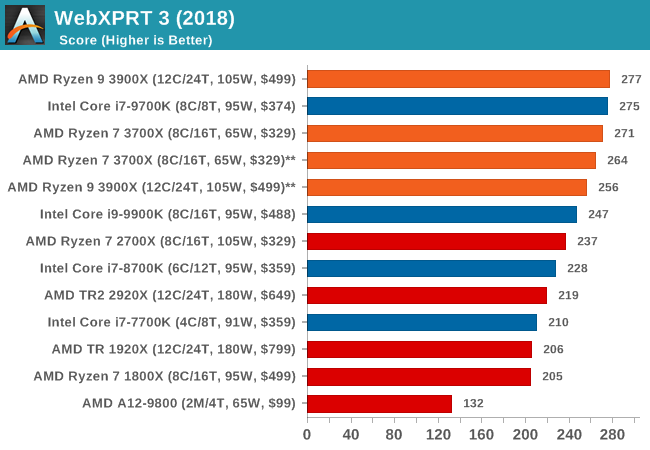
WebXPRT 2015: HTML5 and Javascript Web UX Testing
The older version of WebXPRT is the 2015 edition, which focuses on a slightly different set of web technologies and frameworks that are in use today. This is still a relevant test, especially for users interacting with not-the-latest web applications in the market, of which there are a lot. Web framework development is often very quick but with high turnover, meaning that frameworks are quickly developed, built-upon, used, and then developers move on to the next, and adjusting an application to a new framework is a difficult arduous task, especially with rapid development cycles. This leaves a lot of applications as ‘fixed-in-time’, and relevant to user experience for many years.
Similar to WebXPRT3, the main benchmark is a sectional run repeated seven times, with a final score. We repeat the whole thing four times, and average those final scores.
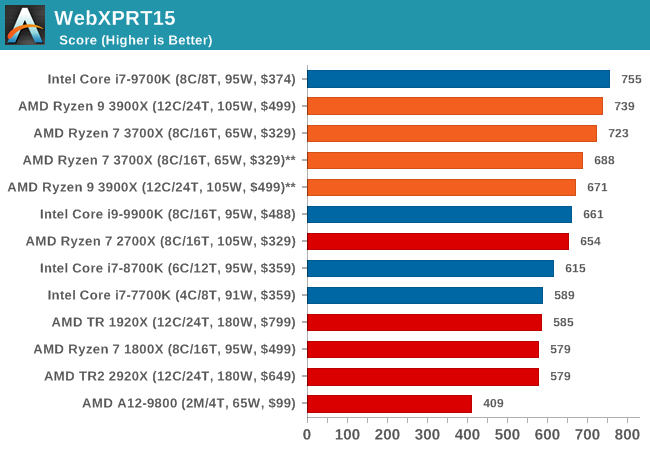
Speedometer 2: JavaScript Frameworks
Our newest web test is Speedometer 2, which is a accrued test over a series of javascript frameworks to do three simple things: built a list, enable each item in the list, and remove the list. All the frameworks implement the same visual cues, but obviously apply them from different coding angles.
Our test goes through the list of frameworks, and produces a final score indicative of ‘rpm’, one of the benchmarks internal metrics. We report this final score.
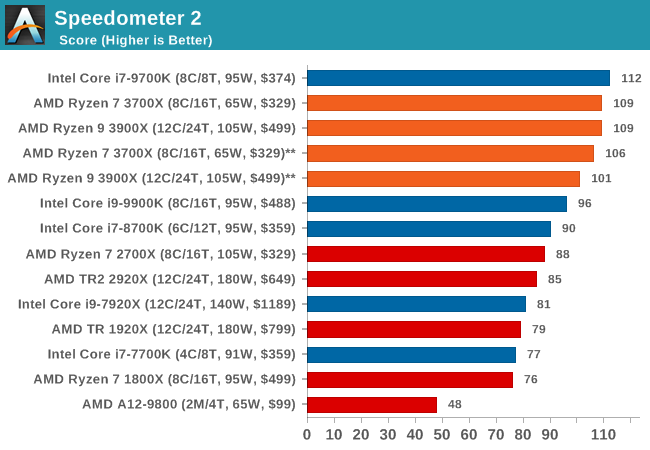
Google Octane 2.0: Core Web Compute
A popular web test for several years, but now no longer being updated, is Octane, developed by Google. Version 2.0 of the test performs the best part of two-dozen compute related tasks, such as regular expressions, cryptography, ray tracing, emulation, and Navier-Stokes physics calculations.
The test gives each sub-test a score and produces a geometric mean of the set as a final result. We run the full benchmark four times, and average the final results.
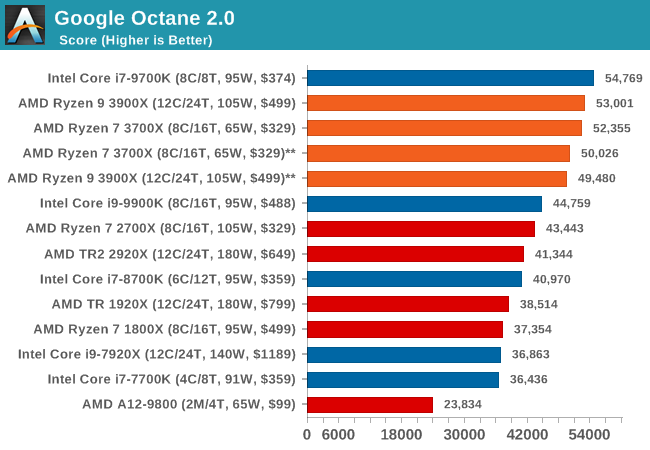
Mozilla Kraken 1.1: Core Web Compute
Even older than Octane is Kraken, this time developed by Mozilla. This is an older test that does similar computational mechanics, such as audio processing or image filtering. Kraken seems to produce a highly variable result depending on the browser version, as it is a test that is keenly optimized for.
The main benchmark runs through each of the sub-tests ten times and produces an average time to completion for each loop, given in milliseconds. We run the full benchmark four times and take an average of the time taken.
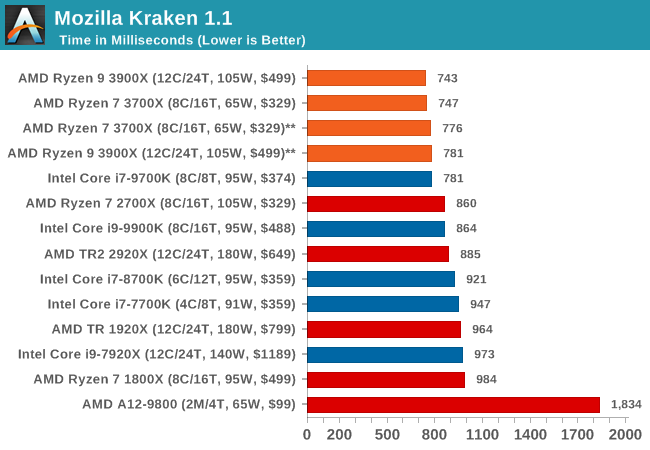
Web Tests Analysis
Overall, in the web tests, the new Ryzen 3900X and 3700X perform very well with both chips showcasing quite large improvements over the 2700X.
We’re seeing quite an interesting match-up against Intel’s 9700K here, which is leading all of the benchmarks. The reason for this is that SKU has SMT turned off. The singe-threaded performance advantage of this is that the CPU core no longer has to share the µOP cache structure between to different threads, and has the whole capacity dedicated to one thread. Web workloads in particular are amongst the most instruction pressure heavy workloads out there, and they benefit extremely from turning SMT off on modern cores.
Whilst we didn’t have the time yet to test the new 3900X and 3700X with SMT off, AMD’s core and op cache works the same in that it’s sharing the capacity amongst two threads, statically partitioning it. I’m pretty sure we’d see larger increases in the web benchmarks when turning off SMT as well, and we’ll be sure to revisit this particular point in the future.










447 Comments
View All Comments
John_M - Sunday, July 7, 2019 - link
Yes. The integrated memory controller is on the IO die, which is part of the Ryzen SoC, not the chipset.BushLin - Monday, July 8, 2019 - link
Right now, there's no indication what CL / timings are applied to all the other systems. CL16 is indeed bottom of the barrel for DDR-3200, you would hope there's no shenanigans with Intel getting CL12 DDR-2666. Why not just run all the systems with the same DDR-3200, it's not like they can't do it.profiaudi - Wednesday, July 10, 2019 - link
Not to be too rude, but the IMC is on the io chipLet, not the chipSet. The chipset actually has an important role for the memory speed, in that a chipset defines a platform and a platform imposes requirements on the power supply and trace routing. While the IMC in 3rd gen can handle 3200MT/s+ completely fine, it is guaranteed to do so only one X570. Anything older is a dice roll as the boards were not designed for such speeds (not a requirement for the older platform).waja - Tuesday, July 23, 2019 - link
Do you know george stevenson story?He earn 3657$ every month at home just working few hours on internet see more by open this connection and click home button.FOR MORE INFORMATION COPY THIS SITE.......... www.online-3.comAndrei Frumusanu - Sunday, July 7, 2019 - link
Just as note for those who haven’t been following: This review wasn’t written by our usual resident CPU editor, Dr Ian Cutress as he unfortunately the timing didn’t work out. We only had a few days time with the new Ryzen CPUs, as such, you might noticed a few bits and pieces missing in our article that we’ll try to address in the next hours and days. We’ll be trying to update the piece with more information and data as soon as we can. Thanks.Also huge thanks to Gavin Bonshor who actually did all the testing and collected all the data for this review, thumb up to him.
plonk420 - Sunday, July 7, 2019 - link
hoping a speedy recovery for him! loved his video with Wendell!loving the article, too. don't suppose you could test cross-CCX latency?
plonk420 - Sunday, July 7, 2019 - link
e.g. pcper.com/2017/06/the-intel-core-i9-7900x-10-core-skylake-x-processor-review/3/main interest is if it is low enough to be harnessed by RPCS3 (PS3 emulator)
ballsystemlord - Sunday, July 7, 2019 - link
CCX benchmarks would be nice.IF power benchmarks were also done last time and probably in the works.
shakazulu667 - Sunday, July 7, 2019 - link
Are Intel results with or without spectre et al mitigations?Ryan Smith - Sunday, July 7, 2019 - link
They are with Spectre and Meltdown mitigations. They are not new enough results to include anything for Fallout/ZombieLoad.